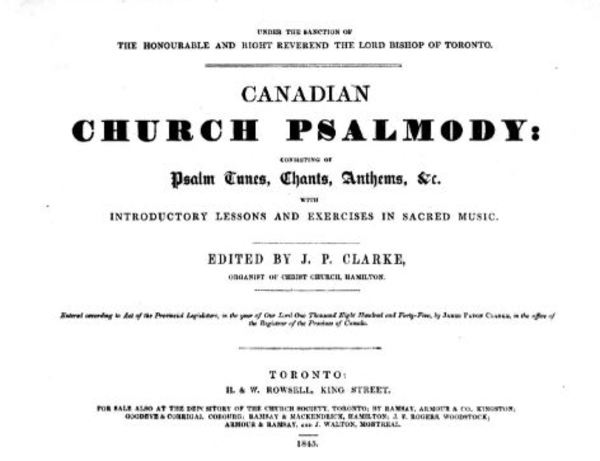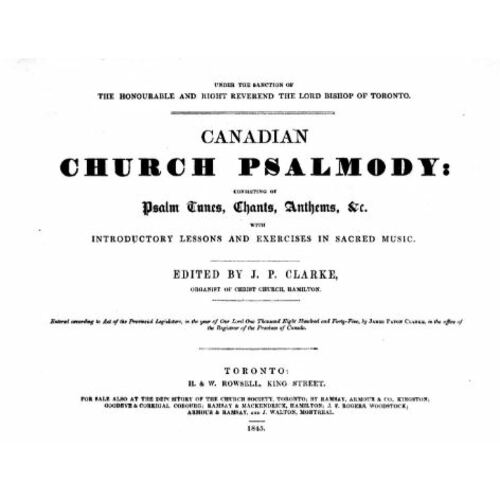
Source: Link
CLARKE, JAMES PATON, musician; b. 1807 or 1808, probably in Scotland; m. Helen Fullerton 25 Dec. 1831, by whom he had several children; d. 27 Aug. 1877, at Yorkville (Toronto), Ont.
James Paton Clarke, the son of a musician, is first reported as a music seller’s assistant in Edinburgh. In 1829 he was a musician at St George’s Church in Glasgow and, in 1834, became organist at St Mary’s Episcopal Chapel in Glasgow. Several of his songs appeared in British periodicals about 1832.
Clarke came to Canada in 1835. He may have settled at Elora, Upper Canada, as a farmer, but his first documented position in Canada was that of organist at Christ’s Church in Hamilton in 1844 and 1845. In 1845 he gave two concerts in Toronto: in one he led a choir at the opening of St George’s Church, and later he conducted a concert planned by John McCaul*, vice-president of King’s College and an ardent promoter of fine music. McCaul probably induced Clarke to move to Toronto, where the latter became conductor of the Philharmonic Society (McCaul was president) from 1845 to 1847, in 1855, and in 1872–73, and of the Toronto Vocal Music Society from 1851 to 1853.
Under McCaul’s influence Clarke usually featured music by Mozart, Haydn, or Beethoven in his concerts. He presented several symphonies by Mozart and Beethoven, although perhaps not in their entirety and hardly in their full instrumentation. He also conducted overtures and excerpts from oratorios, as well as some national, sacred, operatic, and humorous songs, and his own vocal pieces. Many of these performances were local premières. As was then usual, programmes were nearly always mixtures of orchestral pieces, vocal solos, choral music, or instrumental virtuoso display, performed by an equally mixed array of amateur and professional musicians. Clarke was not always a conductor: he also appeared as piano accompanist and as singer in ensembles. He was organist in Toronto at St James’ Cathedral from 1848 to 1849, and probably at St Michael’s Roman Catholic Cathedral.
Clarke became part of the local cultural élite as a composer as well. His songs were written to texts by Samuel Thompson*, the Reverend Robert Jackson MacGeorge*, Catharine Parr Traill [Strickland*], and other Canadian writers. This activity culminated in 1853 in the Lays of the maple leaf, or songs of Canada. It was the longest composition yet published in Canada and one inspired entirely by the country’s scenery and its pioneers, hunters, and woodsmen. It was well received, and one contemporary hoped that he would “ere long again . . . gratify the public by other strains of that harp, which he touches with so masterly a finger. . . .”
Clarke obtained the Bachelor of Music degree from King’s College (University of Toronto) in 1846, almost certainly the first such degree to have been granted by a Canadian university, and he may also have become an honorary music adviser at the college. In 1848 William Henry Draper presented him with three special university prizes for his compositions, the results of a contest. In 1856 he was to receive a degree of Doctor of Music, the first in Canada, from the university but it may not actually have been granted.
The years 1853–56 mark, in fact, the end of Clarke’s brilliant career and the beginning of two decades of rarely interrupted obscurity. He was replaced as the conductor of the Toronto Vocal Music Society in 1853 and was an unsuccessful candidate for a professorship at Trinity College. He is not known to have published any music after 1853 or to have occupied any church or school position. In 1854 his songs were criticized as being “sadly deficient in both design and originality.” He also seems to have left Toronto, but he had come back by 1861 when he co-edited A selection of chants and tunes for the Church of England Diocesan Synod of Toronto.
One more return to prominence occurred when the Philharmonic Society was revived in 1872 with McCaul president and Clarke conductor. The Messiah was performed on 28 Feb. 1873 with 160 singers and 30 orchestral players. Though uneven in quality the performance was judged “exceedingly creditable” in view of the inexperience of the singers. Clarke’s health was failing and the Philharmonic Society continued under other leaders, notably Frederick Herbert Torrington*. Clarke’s death came suddenly four years later.
Clarke was considered a “conscientious and earnest musician, a clever composer, and an able and successful teacher of the piano forte.” Half a century after his emigration, his “reputation of being an excellent musician and vocalist” was still remembered in Scotland. Extremely versatile, as a musician in a pioneer country had to be, Clarke also tuned and repaired organs, and participated as a violinist and violist in several short-lived string quartets during his later years.
In Toronto Clarke had at least 15 vocal compositions published and another ten are known to have been performed, but only one instrumental work has been discovered. His musical invention is rooted in folk song and the idiom of the turn of the 18th century. His better melodies have a fresh outdoor quality; their simplicity is deliberate. The sincerity and clean harmonies of Clarke’s unsophisticated songs stand in contrast to the flood of more pretentious music with feigned emotions which began to be produced in Canada after 1850. His most famous pupil was his son, Hugh Archibald, who made his debut as a pianist in 1854 and was trained entirely by his father. He was appointed in 1875 to the University of Pennsylvania staff, and was one of the first two university professors of music in the United States.
Christ’s Church (Hamilton, Ont.) account book. MTCL, minute book of the Toronto Choral Society, 1845, and of the Philharmonic Society, 1846–47. St James’ Cathedral (Toronto), churchwardens’ register and minute book, 1842–1908.
Canadian church psalmody: consisting of psalm tunes, chants, anthems, etc., with introductory lessons and exercises in sacred music, ed. J. P. Clarke (Toronto, 1845). J. P. Clarke, Lays of the maple leaf, or songs of Canada (Toronto, [1853]). Parochial psalmody: a new collection of the most approved psalm tunes . . . , ed. J. P. Clarke (2nd ed., Glasgow, 1831). A selection of chants and tunes, made by the committee of the Toronto Diocesan Synod . . . , [ed. J. P. Clarke et al.] (Toronto, 1861; 2nd ed., Toronto, 1867).
Anglo-American Magazine (Toronto), II (1853), 648. “Music and composers,” Leader (Toronto), 31 May 1854. “Music in Toronto, reminiscences of the last half century,” Mail (Toronto), 21 Dec. 1878. “The Philharmonic Society: first public concert – the Messiah,” Mail (Toronto), 1 March 1873. A biographical dictionary of musicians, ed. Theodore Baker (New York, 1900). Helmut Kallmann, A history of music in Canada, 1534–1914 (Toronto and London, 1960). James Love, Scottish church music, its composers and sources (Edinburgh and London, 1891), 320. W. H. Pearson, Recollections and records of Toronto of old, with references to Brantford, Kingston and other Canadian towns (Toronto, 1914), 149, 214. D. J. Sale, “Toronto’s pre-confederation music societies, 1845–1867,” unpublished ma thesis, University of Toronto, 1968.
Cite This Article
Helmut Kallmann, “CLARKE, JAMES PATON,” in Dictionary of Canadian Biography, vol. 10, University of Toronto/Université Laval, 2003–, accessed April 26, 2025, https://www.biographi.ca/en/bio/clarke_james_paton_10E.html.
The citation above shows the format for footnotes and endnotes according to the Chicago manual of style (16th edition). Information to be used in other citation formats:
| Permalink: | https://www.biographi.ca/en/bio/clarke_james_paton_10E.html |
| Author of Article: | Helmut Kallmann |
| Title of Article: | CLARKE, JAMES PATON |
| Publication Name: | Dictionary of Canadian Biography, vol. 10 |
| Publisher: | University of Toronto/Université Laval |
| Year of revision: | 1972 |
| Access Date: | April 26, 2025 |



